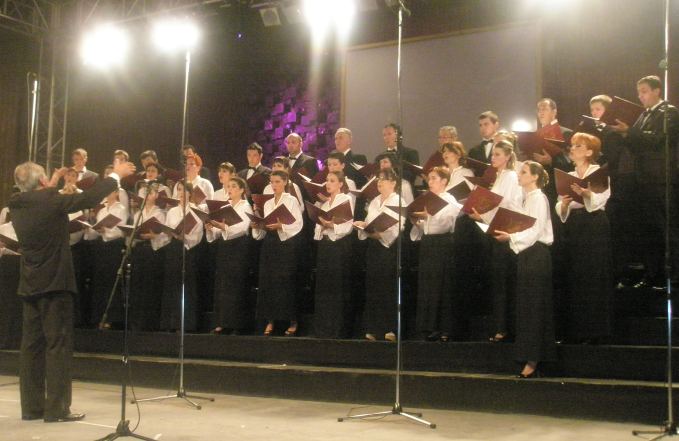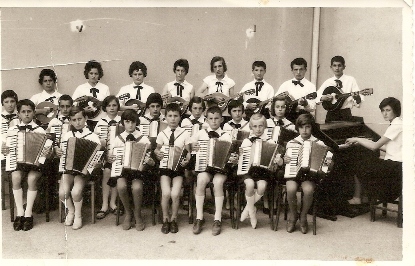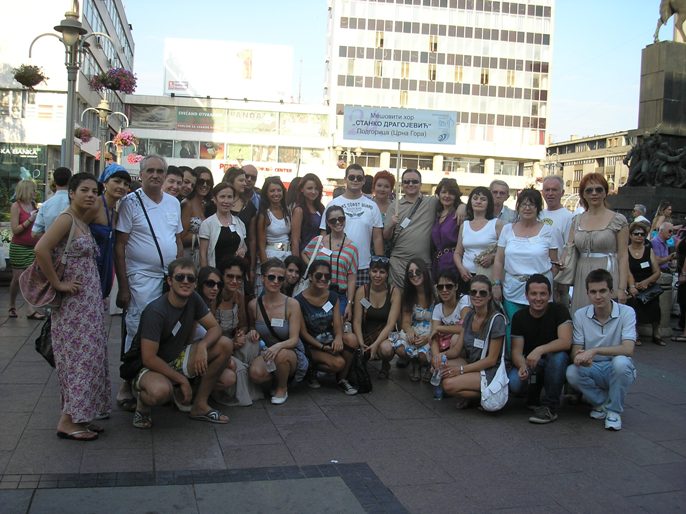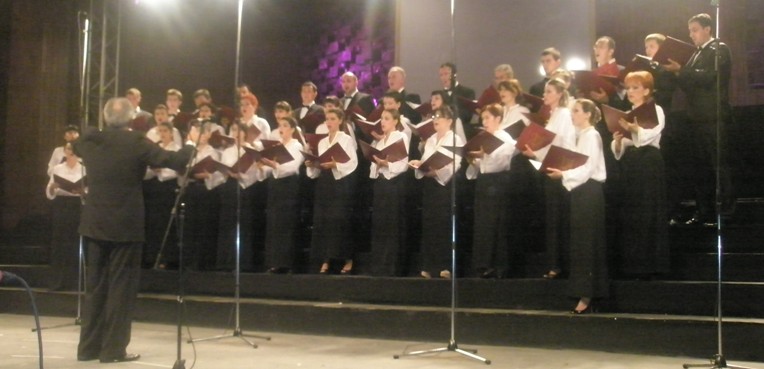which is 67 years long tradition. A symbol of the city, a symbol of the anniversary, celebrations, ceremonies, traditions of progress and preservation
GUARDIANS OF THE TRADITIONAL VALUES
In a very strong competition, where 16 choirs have performed from the region and Europe, the mixed choir KUD "Stanko Dragojević" from Podgorica, with conductor Ilija Dapcević, after 12 years of break on the "24th International Choir Festival "in Niš, won the prestigious award for the best performance of local artist," Milorad Veljković Connects "

Ilija Dapčević was born 1950 in Cetinje. Elementary school and elementary music school he finished in Bijelo Polje. He finished the secondary music school in Titograd and the Music Academy in Sarajevo. From 1974 to 1994, he worked as a teacher of vocational-theoretical subjects (choir, solfeggio, harmony, counterpoint) and from 1994 was the the operations director of the Art School of Music and Ballet "Vasa Pavić". His social work is related to children, youth, culture and the cultural and artistic creativity. He has been conductor of the choir KUD "Stanko Dragojević", with whom he won significant awards. He is a founder and member of the music group "Assa Voce". He won the award “19th December”, of Podgorica.

Musical school, Bijelo Polje - first generation
When was your first contact with music?
It happened unexpectedly. In that period, music school was formed in Bijelo Polje. I never thought that I would be making music. While my aunt was telling me stories about the mariners, because my grandfather Ilija was a seaman, since then I saw myself at the sea and in the maritime school. Then under unexpected circumstances happened music school. We were around twenty in the first generation and only four of us finished on time. In the elementary music school I was playing harmonic. But, unfortunately, I have not continued on the instrumental course, because what I learned in the elementary music school was not enough for the high school, so I enrolled the general music course, which included the piano. In college, I went on the general music course, in order to become a professor of solfeggio, harmony and counterpoint. I am a professor of the specialized disciplines in music schools.
You completed the Academy in Sarajevo. Why in Sarajevo?
I applied in Belgrade, but I was rejected. This was the hardest moment in my life. On my mother’s persuasion, I entered the Academy in Sarajevo. I remember, when someone mentioned Sarajevo as they told me to go “deep into the dead”. Later, I could not force me to leave from Sarajevo. Sarajevo had philharmony, spring song, the Ilidža festival, the entertainment groups. In that period, Sarajevo perceived musical renaissance. Those three and a half years I was dancing modern ballet. Very interesting life. Then I started working at Radio Sarajevo. Thanks to the circumstances I could have worked. Then I worked in Hrasnica teaching harmonic. I worked with Damian Babić, who was from Berane, founder of the festival Ilidža, artistic director and an excellent teacher, who was also the director of Sarajevo’s Diskoton. An amazing man, who after the war returned to Montenegro and in Montenegro he died almost unknown.
When have you returned to Podgorica?
After graduating, I applied as a professor at the music school in Podgorica. Here we have over twenty music professors and the most of them used to be my students. Today we have mutual respect. Twenty years, twenty generations. I am almost 20 years a principal. So many years of work experience and attachment to just one school, that can be done only if you like the job. I love the music school, the collective, and these children. I love the job that I do.
When have you started the cooperation with the choir "Stanko Dragojević"?
As a high school student, I sang in the choir, "Stanko Dragojević" for big celebrations such as school anniversaries and I wanted to continue, but in 1969 Josip Broz Tito came to Podgorica. A program was organized at the Hotel "Montenegro". There sang only the old members of the choir, and those like me who were constantly coming to the rehearsals were not engaged. That situation I experienced as a disappointment and I immediately left the choir. Later they called me, but I came back in 1977, when I returned from the army and continued to sing in the choir. I sang for a while, and later I was promoted into accompanist, where I worked ten years as an assistant conductor and singing at the same time (1980-1990). In 1991 I first conducted the choir "Stanko Dragojević" independently and continued after for 20 years more, except two or three years when the choir was not working, but even then they called me the conductor. The year 1990 in Niš I shared a concert with the conductor. I conducted independently at the famous festival "Georgjie Dimitrov" in 1991. There are five European competitions, which took place in Bulgaria, Italy, Hungary, Spain and France. Only the first three choirs receive awards. Choir "Stanko Dragojević" in Varna won the fourth place that year. Then I had two choirs, Chamber Choir and the Grand Choir. We competed by strict rules. The jury was composed of experts from famous European music universities, and it was not easy. With the both choirs, we have been successful. It was a good record. Later, I upgraded the system and we started winning as choir "Stanko Dragojević". So in 1994 we won the contest Mokranjac days in Negotin in the famous choir competition.
You have won many awards with the choir, "Stanko Dragojević".
Among the other awards in 1994 I got the December's prize for my contribution in Podgorica’s culture. In 1996 in the Yugoslav choir festivals (JHS) in Niš, which is a prestigious festival and it is held in the summer fortress on a stage with more than 5000 audience, the choir "Stanko Dragojević" was the only ensemble from Yugoslav region, which was involved in all ceremonies from the existence of Yugoslavia. In all competitions until 2000 were regular participants. We recognized ourselves in the society by who had been more times in Niš. Niš has always been a great experience, nice socializing. The festival lasts four days, so there are many choirs, for example, in 1996, 19 choirs competed and we were the best in the Yugoslav choir festival. In that, time in the choir sang around 50 to 60 people. That year on stage we were between 55 to 60 people. We had an attractive program, we won on a unanimous decision by the jury, which was very difficult. So in 1998 we received two awards for contemporary interpretations by Yugoslav and foreign contemporary authors. That was rare and usual because that award goes to all the choirs not just to one. In 2000, we won the award for the performance of the Yugoslav contemporary authors. We have received many awards from Niš.
 Choir"Stanko Dragojević", Niš, 2012.
Choir"Stanko Dragojević", Niš, 2012.
How long did the disruption in the choir lasted?
Four and a half, five years. We worked 2002 and 2003, but we did not perform anywhere. I was enthusiastic in trying to keep the choir. Money is important, but it was not on the first place for me. The Society of Friends of Podgorica filed an initiative that the choir should start working again. Mihailo Banjević, Baća Radović, Beli Selhanović and Dano Petrović enabled the choir "Stanko Dragojević" to continue its tradition. It is the choir of the city. Previously, we have not had problems with finances, because we had a budget. Now we are a non-governmental organization, which is illogical for a cultural society. It could have been a non-governmental organization with particular importance, that should be corrected. It is well known what the choir "Stanko Dragojević" means not only to Podgorica, but also to Montenegro.
You are the founder of the ensemble “Assa Voce”?
This is a very interesting story related to the choir "Stanko Dragojević", when there were doubts will the choir exist or not. On a friend invitation named Andrija Milosević to for a group and perform for the Day of the Municipality of Kotor, "Assa Voce" group was formed, which in the first team consisted of four members (Milan Vuković, Dejan Janković, Mirko Nenezić and I). We already formed a quartet that we called the Quartet "Stanko Dragojević" where male and female members sang. In fact, nine people is the right number for such an ensemble. In cooperation with the Ministry of Tourism, we went to Slovenia, Serbia, Russia, China, Luxembourg, and Scotland. We have built a name and had good reviews. I remember when we sang on the famous Split rally two years ago. Big stage, our night, we sang folk songs in the center of Dalmatia. In the newspaper "Free Dalmatia" was released a two pages article with a title written in capital letters "WHEN THE MONTENEGRIN GROUP STARTS TO SING". Of course, for them we were special and we were the best. The concert was so well received that they were all delighted. The Montenegrins in Dalmatia had prepared a magnificent welcome.
What is your satisfaction in the work you do?
I am glad that in each segment which concerns music I can recognizes someone whom I worked with. For example, Sergej Cetković was a student at the music school. I remember his gesture when he had a concert at the CNP. All the income from the concert he gave to the Music School. Good communication, good gesture. Then Igor Perazić, Karadaglić, Simovic, Perovic, Miljanić and many other successful musicians are former students of the music school. Twenty years I have conducted the choir. All students have sang in the choir and most of them sing in the choir at the Music Academy. I was doing my job from my heart. Many good things happened to me with the children at the school and with the choir. That is a guarantee that what I have done was good.
Are you satisfied with the conditions at the Music School?
We got a building, which was crucial, we were suppose to get an equipment but then there was no money. This year we received new instruments for each classroom.
The students from the music school "Vasa Pavić" today as in previous years, are winning awards both in Montenegro and on international competitions.
How successfully we do this job, you can see from the children. If a child is playing well and is getting awards, means that we work well. If a child does not play good, we all know the reason, there is not any philosophy. The school has excellent teaching staffs which know how to identify the gifted children. These are very musically talented children. However, it is sometimes very difficult to judge in ten minutes if someone is talented for music or not. Today the school has over 850 students. We have three schools in one, ballet school, primary and secondary music schools.
Does this means that we are a talented nation?
The most talented. Now we have 13 music schools in Montenegro and 4 secondary schools. They are leaded by people who were students in these schools. Ten principals of those institutions studied here, and now they work in Bijelo Polje, Berane, Podgorica, Bar, Tivat and other cities.
132 years of cultural and artistic creativity
When after Titograd’s liberation from the Turkish occupation in 1880 a "Cultural and performing society reading room" was established, which consisted of choir, orchestra and drama section, it was a hint of versatile cultural creativity and flourishing amateur activities. Until the Second World War in Titograd have worked 15 cultural societies, which were in different aspects of its activities gathered more than 1500 members. It was the Cultural Society of the reading room, a theatrical association of the National Voluntary Reading Room, Muslim fun-singing society "Podgorica", the First Podgorica Singing Society "Branko", the Artisan orchestra, the First Podgorica dilettante Society, the Municipality’s bleh music, Muslim society, "Napredak," the Workers' Singing Society, the Theatrical Association “Napredak”, Students Fellowship "Njegoš", Workering cultural-ensemble "Abrasević," the Muslim Cultural Society "Gajret," the Youth and Student bleh music and the student cooperative "Samopomoć". Through its activity, the associations have made a significant contribution to the cultural heritage of Podgorica. These associations have contributed the development of the multi-national and multi-religious relations and wealth of mutual cooperation. Most of these associations were under political or other conditions stopped working or were re-formed again under a different name.
The tradition continues
At the end of 1945 in liberated and totally demolished Podgorica the cultural club "Stanko Dragojević" was formed. This meant a continuation of a truly fruitful and different cultural and artistic activities in Podgorica. The name "Stanko Dragojević" used by the association, not only symbolically ment a continuation of the progressive line of development of such activities, but in the name of the working 'tribune and the many years of active members and leaders of the Workers' Singing Association and the Club "Abrasević", Stanka Dragojević, association members built its affirmation of their socialist consciousness with advanced human desires. The Republic’s President Tito awarded the association "Stanko Dragojević" with the Order of Merit for the people. The first year the choir had in its activities more different sections, which abolished due to lack of finances and lack of suitable practicing rooms. The mixed Choir participated in various amateur festivals in Yugoslavia. Numerous diplomas, honors and awards testify of thechoir’s successes and achievements, which is among the best Yugoslav amateur choirs. Through the various sections of the association, from the liberation till today passed a large number of members. For such achievements and its recognition both at home and abroad, major credit goes to the conductor Cvjetko Ivanović. With his arrival in 1955, the choir recorded continuous success.
Recognitions and awards
The choir KUD "Stanko Dragojević" from Podgorica, continues the 132 years of tradition of choral singing and cultural and artistic work. Eve if the choir works on amateur basis, is known and recognized choir ensemble in Montenegro and abroad. Expert’s opinions often classified the choir on the top of choral singing. The choir has won all the rewards that can be won in this area. We'll mention just few, the second award in France in 1961, first award in Czechoslovakia in 1968, third award at the World Championship in England in 1970, the absolute award winner at the "Mokranjač days" in 1994, Absolute Winner "Yugoslav choral festival" - Niš 1996, and two second awards and one third place award in Slovakia in 1997, two awards for best performance of work of local and foreign authors in 1998, third prize award at the "Mokranjač days" in Negotin 2010, the award "Milorad Veljković Spaja" for the best performance of the domestic composition, Niš 2012. The Choir Conductor at KUD "Stanko Dragojević" in the last twenty years is Ilija Dapčević, under whose wand the choir has won numerous awards.

"24th International Choral Festival "in Niš, from 7-10. July 2012.
One of the oldest musical events in Serbia, the International Choral Festival on which sixteen choirs from the region and Europe took part, was held from 7-10 July, at the Summer Stage at the Fortress in Nis. In front of the audience were presented over 500 singers and musicians. 24th Niška choral celebrations were dedicated to the celebration of the four decades existence of the choir "Kollegium muzicum", and a centenary celebration from the birth of the choral educator, conductor and composer Vojislav Ilić.
At the 24th International Choir in Niš, the mixed Choir "Stanko Dragojević" from Podgorica have presented the compositions from S. Rachmaninov, Jovan Zlatostog, A. Bruckner, Hail Bride and Bora Tamindžić.
After the arrival in Niš they had an organized lunch and in the afternoon they had a parade of the city’schoirs. A luxurious, unusual picture that embellished the city during the hot days in July. In the choir there was a positive energy that binds the members, good company, then travel, performances, awards, adrenalin before the show, uncertainty, hope, and confidence in yourself was good for everyone. That feeling was felt especially after the second night when they had their show. After the applause with which they were generously rewarded, the certainty was confirmed. There was a bit of stage fright, which has disappeared the next day on the wings of safty and unique emotions worn by the notes on the rehearsals together with the conductors Ilija Dapcević and Zojom Djurović. They delighted the city audience and earned their applause too. A special blend of emotions was felt in their performance comparing to other choirs. They had the security that is well needed after a two-hour presentation of the Ensemble "Collegium Muzicum", which celebrated jubilee of forty years of continuous work. It was not easy, but a new energy, a desire to shine in Nis even after twelve years of break, the choir "Stanko Dragojević", had given their best and won the award for the best performance of a local author. People from Niš have welcomed them very nicely. The third festival day they spent it relaxing in Niš spa center and enjoyed its charms, where I recorded all the impressions the day after the concert.
(Read the complete text of the printed issue of Renome number 6).
Interview: Ilija Dapčević, music proffesor, conductor
Interviewed by: Radmila Krgović